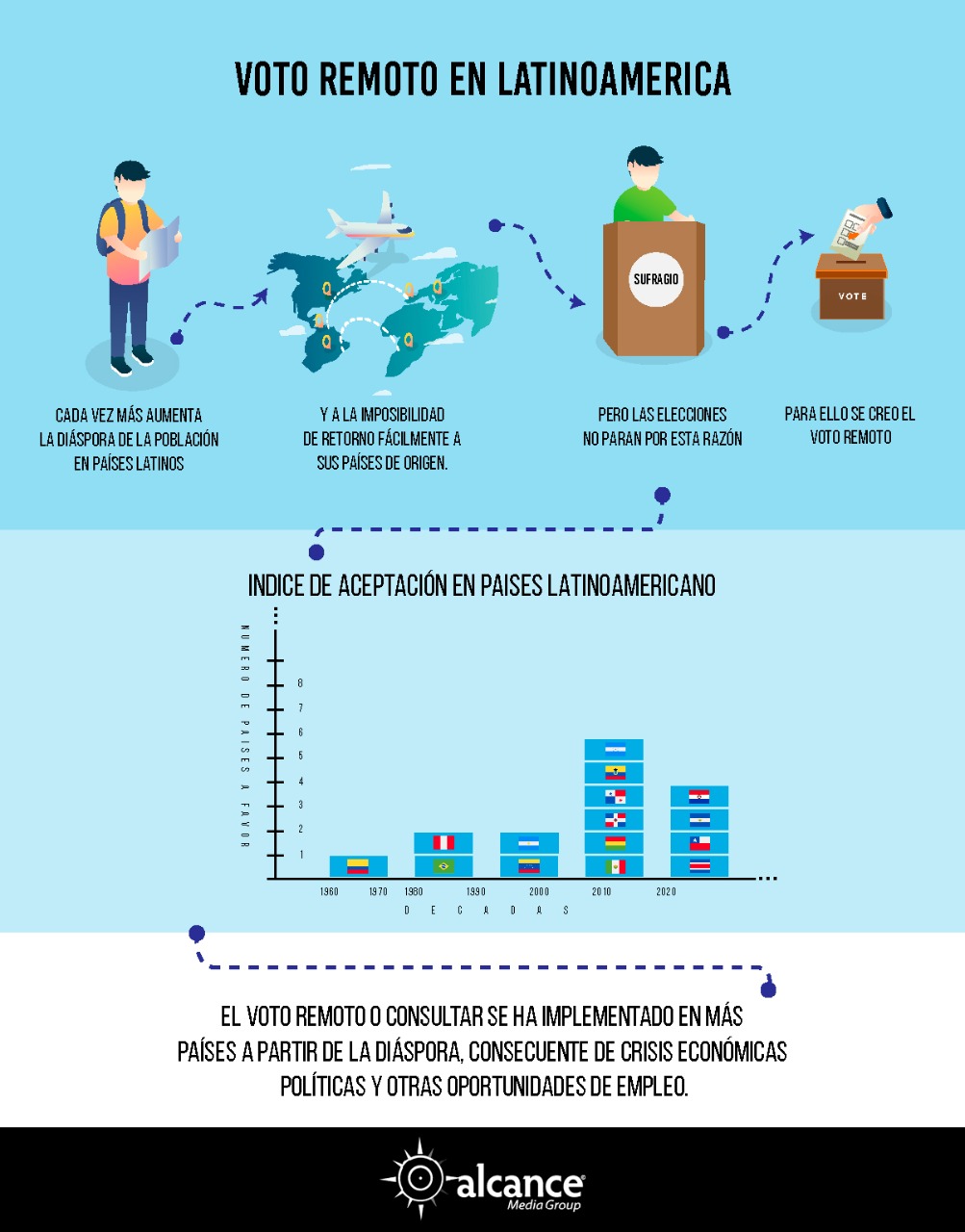Latin American countries that allow remote vote
Having the right to vote is a universal element that must be fulfilled. But, what happens when a big number of people must emigrate from their native countries, either for economical, political or work reasons? The diaspora affects every democratic country in the world, and Latin America is not an exception. Many people wonder: How can I vote for my country from abroad? In these cases, a remote vote or consular vote is appealed, which is already approved by at least 15 latino countries.
Nowadays, at least 112 nations have some device that allows voting from abroad. This number represents more than 50% of world’s democracies. The most frequent method is the consular vote, which can be accessed through the respective consulate of the country of origin. In this context, these are the Latin American countries that accept vote abroad, their strategies and their ways.
Mexico
In 2005, the United Mexican States adopted a modality that allows to vote abroad through their embassy, and it was implemented in 2006. This modality is applied for national and local elections; this includes presidential and legislative elections (the last one is for the senate only). Registration is permanent and can be done in person, mailed, or online, no more than six months before the elections, and the identification card is required.
Costa Rica
This Central American country allows to vote abroad since 2012, for presidential and advisory elections. Registration is permanent and can be done in person, through the country’s embassy or consulate, up to four months before the election. An identification card is required.
El Salvador
This country accepts voting abroad since 2013, for national presidential elections, through the embassy. Registration can be done in person and online, no more than six months before the election, using the identification card.
Honduras
The vote abroad is allowed since 2001, for national presidential elections. Registration is permanent and can be done in person at the embassy or consulate (in USA only), up to three months before the election, using the identification card.
Panama
Voting from abroad is accepted since 2006 in Panama, for presidential elections. Registration is permanent and can be done in person or online through its official website. People can register up to one year before the event, using a valid identification card.
Argentina
This South American country has guaranteed the right to vote since 1991, for those citizens living abroad. Registration is permanent and can be done in person through the embassy, or online. Argentinians can register up to six months before the election, using their identification document (DN).
Bolivia
Bolivia accepts votes from abroad since 2006, for presidential and consultative elections, and revocation of mandate. Registration is permanent and can be done in person through the consulate or theembassy, up to four months before the event. A valid identification document or passport are accepted.
Brazil
Consular vote is allowed for presidential elections only. It was adopted in 1965, and implemented in 1989. Registration is permanent, and can be done in person or through the embassy (or consulate), with a valid national identification document.
Chile
This country adopted the consular vote in 2014, but implemented it in 2017 for presidential elections. The remote vote can be cast through the consulate only, with a valid national identity document or passport.
Colombia
The New Granada country was the first Latin American country to adopt the consular vote in 1961 for its citizens living abroad. The remote vote was implemented 1962, for national presidential, legislative (both chambers), and consultative elections.
Registration is permanent and can be done through the embassy (or consulate), up to three months before the event, with a valid identity card or passport.
Ecuador
Remote vote was adopted in 2002 for national presidential and legislative elections. Registration is permanent and can be done through the embassy (or consulate), up to five months before the election, using a valid national identification card or passport.
Paraguay
Remote vote is legal for citizens living abroad since 2012, but was implemented in 2013, and is allowed for presidential and legislative (senate only) elections. Registration is permanent and can be done in person at the embassy or consulate, up to three months before the event. A valid national identification card is requested.

Peru
Peru legalized the vote for its citizens from abroad in 1979, and implemented it in 1980, for presidential, legislative and consultative elections. Registration is permanent and can be done through the embassy or consulate up to three months before the election. A national identification document is required.
Dominican Republic
This country adopted the remote vote in 1997 and legalized officially in 2004, for presidential and legislative (both chambers) elections. Registration is permanent and is done in person at the embassy or consulate, up to three months before the event, using identification and electoral cards.
Venezuela
Remote vote was adopted in 1993 for citizens living abroad, and was legalized in 1998. It is allowed for presidential and consultative elections only. Registration is permanent and must be done in person at the embassy or consulate up to three months before the election. A national identity card is required.
How to vote from abroad for elections in Guatemala? Some countries in Latin America and the Caribbean, such as Uruguay, Cuba and Nicaragua, have not legalized the remote or consular vote for their citizens living in other countries. Countries mentioned in previous sections are the only ones that, under their own conditions and special characteristics, have approved the remote vote legally.
You can find more related information in www.alcancerng.com
Recommended articles:
- Latino Participation in Winter Sports
- Hispanic Health Insurance Roulette
- Drones and the Hispanic Community
Photography: https://www.pexels.com/photo/person-dropping-paper-on-box-1550337/
